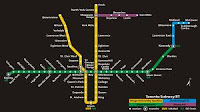This version of the article, “New Subway Trains in Toronto,” is a shorter version of the same article, and it contains simpler words. Similarly, the curriculum connection, grammar and extension activities are simplified.
This version of the article could be used by ESL students, early readers or students on modified reading programs.
We created a second article so that you can more easily differentiate in your class. With this article, students can access the same article content but at a level that is appropriate for early readers.
NEW SUBWAY TRAINS IN TORONTO
Toronto is getting some new subway trains.
 |
| The new subway trains will look a lot nicer. Image: www.ttc.ca. |
There will be 70 new trains, with six cars each. They will cost about $1-billion.
In every train, all six cars will be open inside. So you will be able to see (or walk) all the way from the front of the train, to the back. The cars will be joined by a flexible strip of floor that you can walk on.
The old trains used to have poles in the middle of each car. The new cars do not. That will give riders more room to move around. There will still be lots of poles on the sides to hold onto.
.jpg) |
| Many of the old subway trains will still run on the Bloor subway line. Image: spacingtoronto.ca. |
Curriculum Connection
When we read, we often make pictures in our minds in order to understand. This is called visualization.
After reading the article, draw a picture of what you think the new subway car will look like. Label your picture to show all of the new parts of the subway car.
Primary:
identify a few reading comprehension strategies and use them before, during, and after reading to understand texts, initially with support and direction (OME, Reading: 1.8)
Grammar Feature
A noun is a part of speech. It can be a person, place or thing. Some nouns that are in the article are: subway (thing), Toronto (place), floor (thing).
 |
| Toronto's subway map, showing the Yonge and Bloor lines. |
Extensions
Why do you think it is important for a city to have a public transit system?
If you were in charge, is there anything else you would add to make the new subway cars better?
How much is 1 billion? Use drawings, numbers or manipulatives to show this amount.
No comments:
Post a Comment